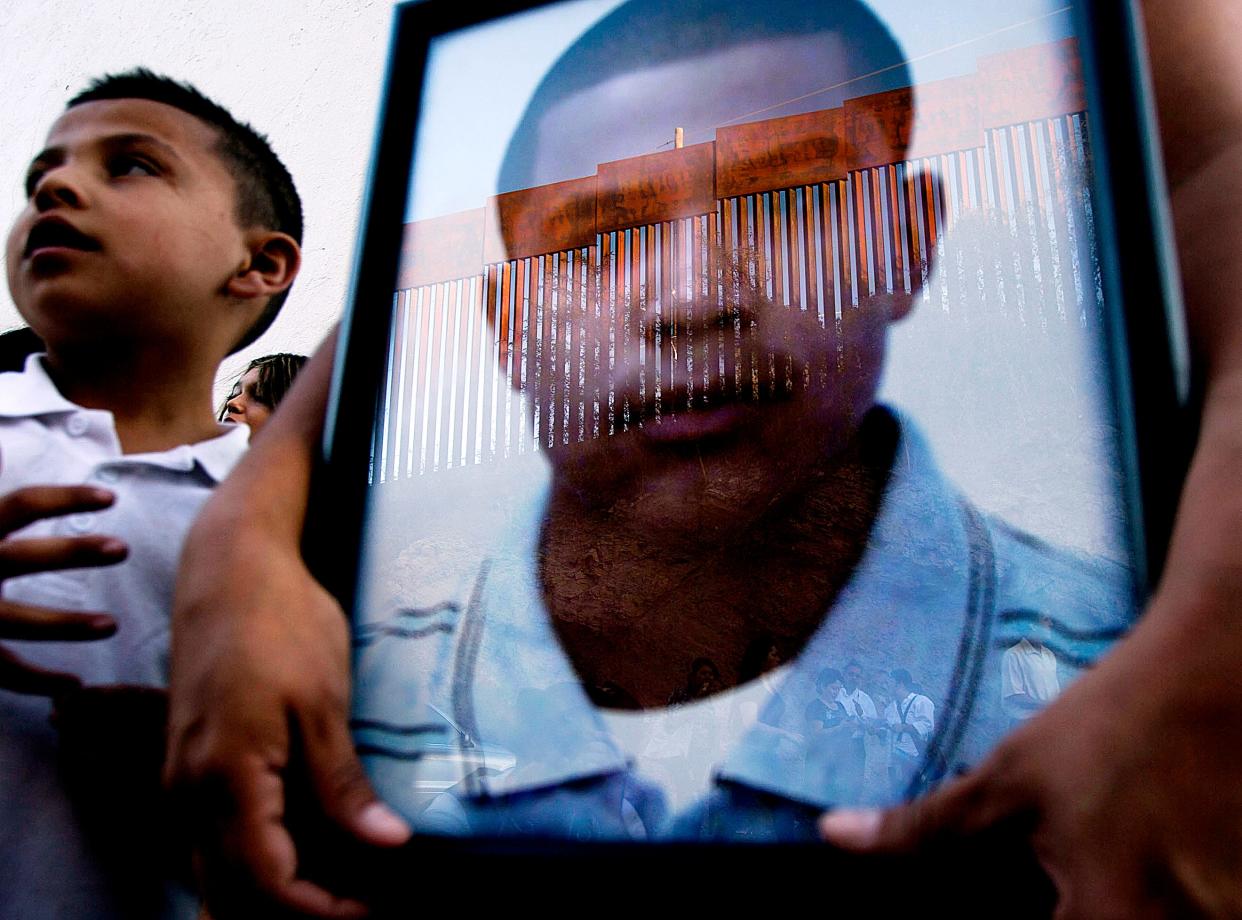Families demand justice for loved ones killed by the Border Patrol as agency turns 100

As the U.S. Border Patrol celebrates its 100th anniversary, families and advocates are still demanding justice for their loved ones who died at the hands of U.S. Border Patrol agents.
Families, community leaders and advocates gathered Tuesday at Imperial Beach, California, to demand accountability for Border Patrol violence.
“From San Diego, California to Brownsville, Texas, all along the U.S.- Mexico border, border communities have been suffering and been victimized by violence. Violence perpetrated by Border Patrol,” said Lilian Serrano, director of the nonprofit Southern Border Communities Coalition.
Serrano pointed to the 304 people who died from encounters with U.S. Customs and Border Protection since 2010, with the highest number of deaths happening during President Joe Biden's administration, according to the organization’s analysis and tracking of media coverage and agency news releases. She noted that no on-duty agent has ever been convicted of a killing.
She was critical of the agency's allowed use of racial profiling and highlighted a recent report from the U.S. Government Accountability Office’s investigation of the Border Patrol’s critical incident teams, which were disbanded after being accused of cover-ups.
A Customs and Border Protection spokesperson responded Wednesday with a written statement to The Arizona Republic.
"CBP — including the U.S. Border Patrol — is firmly committed to accountability and transparency. In the last few years, the agency has implemented new use of force standards; fielded thousands of body worn cameras and standardized the rapid release of critical incident footage; and has implemented a new vehicle pursuit policy — all to better support our personnel and the communities we serve," the statement said. "CBP also releases a wide range of information about our operations regularly including encounter and seizure data, use of force statistics, and detailed statements regarding all critical incidents. These measures place CBP at the forefront of federal law enforcement agencies. We will continue to prioritize accountability and transparency and take any appropriate steps to update policies and procedures, as we perform our critical homeland security mission."
Mothers and wives of people killed in Border Patrol custody spoke Tuesday at the event.
Araceli Rodríguez spoke about her 16-year-old son Jose Antonio Elena Rodríguez who was shot by a Border Patrol agent while walking unarmed in Nogales, Sonora. The agent, who fired through the border fence from the U.S. side, was found not guilty in 2018.
“Border Patrol seems to be untouchable,” Rodríguez said. “They have permission to kill children and teenagers. … There has not been justice. Nothing happens to them. They keep killing. … This doesn’t stop.”
Rodríguez’s case is just one of many, she said.
In another case, 14 years ago, Anastasio Hernández Rojas was tortured and suffocated by border agents while in Border Patrol custody at the San Ysidro Port of Entry. Agents deployed a stun gun as he tried to resist arrest after his deportation to Mexico and his subsequent attempt to reenter the country. None of the agents or officers involved were criminally charged, and it remains unclear whether anyone was disciplined.
His case is under investigation by the Inter-American Commission on Human Rights. Serrano said this is a landmark case, and the first time an international court is investigating a U.S. officer.
Rojas' widow, Maria Puga, continues to pursue justice for him. She spoke at Tuesday’s event demanding accountability from the Border Patrol and denounced the violence.
“In my case, the agents continued working, happily continuing their lives, while my family was destroyed,” Puga said. “What is happening with this government? Why isn’t the government listening?” she said.
The last speaker at the event was a resident of Las Cruces, New Mexico, who described how he and his family members are treated differently by the Border Patrol because of their names, backgrounds and the color of their skin.
Jovanny Hernández said his family has been racially profiled and made to feel like criminals by border patrol agents.
Las Cruces is encircled by six Border Patrol checkpoints, impacting how residents in the borderlands region live, he said.
“As a child, I watched my parents go through the checkpoints and receive abuse by Border Patrol agents asking them … what their intentions were in this country when they had been living here for more than two decades,” he said, adding that he was made to feel inferior.
The event in San Diego highlighted the continued drive of victims such as Puga and Rodríguez to continue fighting until people are held accountable.
In the fight for Border Patrol accountability and transparency, Serrano said communities have been resisting, organizing, documenting and raising their voices. They will continue to do so in the face of what she described as terror inflicted on the region by the Border Patrol.
"We will continue to fight until every single one of our human rights is respected until respect and dignity in the border region is a given and not something that we have to aspire to," she said.
Reach the reporter at sarah.lapidus@gannett.com. The Republic’s coverage of southern Arizona is funded, in part, with a grant from Report for America. Support Arizona news coverage with a tax-deductible donation at supportjournalism.azcentral.com.
This article originally appeared on Arizona Republic: The Border Patrol's 100th anniversary: Families demand accountability

